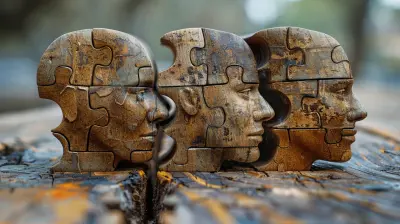18 March 2025
Relationships can be tricky, right? Whether it's with a partner, friend, or family member, maintaining a healthy connection takes effort, understanding, and—here’s the kicker—emotional intelligence (EQ). You’ve probably heard the term "emotional intelligence" tossed around a lot, especially in recent years, but what does it actually mean? More importantly, how does it play into the success (or failure) of our relationships?
In this article, we're going to dive deep into what emotional intelligence is, how it impacts relationship dynamics, and why it's so critical for relationship success. So, grab a cup of coffee (or tea, if that's your thing), and let’s get into it!
What Is Emotional Intelligence?
Before we get into the nitty-gritty of how emotional intelligence affects relationships, let's break down what it actually is. Emotional intelligence, or EQ, refers to the ability to recognize, understand, manage, and influence our own emotions as well as the emotions of others.In simpler terms, it’s not just about being "smart" with your feelings. It's about being aware of them, being able to control them, and even using them to enhance your interactions with others. It’s a bit like being the conductor of an orchestra—except the instruments are your emotions, and you’re making sure they don’t create a chaotic symphony.
The Five Components of Emotional Intelligence
To better grasp emotional intelligence, it's helpful to understand its five key components:1. Self-awareness: Recognizing your own emotions and how they affect your thoughts and behavior.
2. Self-regulation: The ability to control or redirect disruptive emotions and impulses.
3. Motivation: Having a passion or drive to meet goals for reasons beyond money or status.
4. Empathy: Understanding and sharing the feelings of others.
5. Social Skills: Managing relationships to move people in the desired direction.
Notice how all of these components directly relate to how we interact with others? That’s exactly why EQ is so important in relationships.
Why Emotional Intelligence is Crucial in Relationships
Let’s be real—relationships are complicated. They come with their fair share of highs and lows, and navigating the emotional rollercoaster can sometimes feel impossible. That's where emotional intelligence comes in.Communication: The Heartbeat of Relationships
Good communication is the glue that holds relationships together. And guess what? Emotional intelligence is at the core of effective communication.When you have high emotional intelligence, you're more likely to:
- Listen actively: You're not just waiting for your turn to speak; you're genuinely engaged.
- Pick up on non-verbal cues: Sometimes, what’s unsaid is just as important as what’s said. EQ helps you notice body language, tone of voice, and other subtle emotional clues.
- Express yourself clearly: You're able to communicate your needs and feelings in a way that doesn’t come off as aggressive or passive-aggressive.
In contrast, a lack of emotional intelligence can lead to misunderstandings, resentment, and arguments. Ever had a conversation where you felt like the other person just wasn't "getting it"? Chances are, emotional intelligence—or the lack of it—was at play.
Conflict Resolution: Turning Tension into Growth
Conflicts are inevitable in any relationship. Whether it’s a small disagreement over what to watch on Netflix or a major argument about long-term goals, conflicts arise because two people can’t always be on the same page. But here's the thing: Conflict doesn’t have to be destructive.Emotionally intelligent individuals handle conflicts in a much healthier way. They are:
- Calm under pressure: Instead of blowing up or shutting down, they remain composed and think things through.
- Empathetic: They’re able to see the situation from both sides and validate the other person’s feelings.
- Solution-focused: Rather than getting stuck in the blame game, they work toward an outcome that benefits both parties.
With emotional intelligence, conflict becomes an opportunity for growth rather than a ticking time bomb waiting to explode.
Emotional Support: The Cornerstone of Strong Bonds
Everyone needs emotional support from time to time. Whether you're comforting a friend who's had a bad day or supporting your partner through a tough period, being emotionally available can make or break a relationship.When you have a high EQ, you're better at offering the emotional support your loved ones need. You can:
- Recognize when someone is struggling: Even if they don’t outright say it.
- Provide comfort in a way that resonates with them: Some people need words of affirmation, while others might need space. Emotional intelligence helps you figure out what’s best for the situation.
- Set healthy boundaries: While you’re empathetic, you also know when to take care of your own emotional needs.
Ultimately, emotional intelligence enables you to be there for others without losing yourself in the process.
How to Develop Emotional Intelligence in Your Relationships
So, what if you feel like you're not the most emotionally intelligent person out there? The good news is that emotional intelligence isn’t something you're born with or without. It’s a skill you can develop. Here’s how.1. Practice Self-Awareness
You can't improve what you don’t understand. Start by paying close attention to your own emotions. When you feel upset, ask yourself why. Are you angry because of something someone said, or is there a deeper issue at play? The more aware you are of your emotions, the more control you’ll have over them.2. Improve Your Empathy
Empathy is the cornerstone of emotional intelligence. You can practice empathy by:- Listening without judgment: Don’t jump to conclusions or immediately offer advice. Sometimes, people just need to be heard.
- Putting yourself in the other person’s shoes: Imagine what they must be feeling and how you would want to be treated in that situation.
3. Work on Your Communication Skills
Communication is key to any successful relationship, and emotional intelligence makes you a better communicator. To improve your communication:- Be clear and direct: Don’t beat around the bush. Express your needs and feelings openly.
- Practice active listening: Show the other person that you're fully engaged in the conversation, not just waiting for your turn to speak.
- Use "I" statements: Instead of blaming the other person, express how certain actions or words make you feel. For example, "I feel hurt when you don’t listen to me," instead of "You never listen to me!"
4. Learn to Manage Your Emotions
It's easy to let emotions get the best of us, especially in heated situations. But emotional intelligence requires emotional regulation. Try these techniques:- Take a pause: Before reacting, take a deep breath or step away from the situation for a moment.
- Reframe your thoughts: Instead of thinking, "This person is trying to upset me," try, "Maybe they’re having a bad day."
- Practice mindfulness: Being mindful of your emotions in the moment can help you prevent impulsive reactions.
5. Cultivate Emotional Resilience
Emotional resilience is the ability to bounce back after emotional setbacks. Life and relationships will throw challenges your way, but emotional intelligence helps you cope without falling apart. To build your emotional resilience:- Accept that setbacks are part of life: Instead of dwelling on problems, focus on solutions.
- Develop a positive mindset: See challenges as opportunities for growth rather than as insurmountable obstacles.
The Long-Term Benefits of Emotional Intelligence in Relationships
So, what’s the payoff for all this work on emotional intelligence? Is it really worth it? The short answer: Absolutely.Stronger, Deeper Connections
When you’re emotionally intelligent, you're able to form deeper, more authentic connections with others. You’re not just skimming the surface; you're diving into the depths of emotions, understanding, and mutual respect.Greater Relationship Satisfaction
People with high emotional intelligence tend to have more satisfying relationships. They communicate better, resolve conflicts more effectively, and offer emotional support when it's needed most. This leads to happier, more fulfilling partnerships, friendships, and family dynamics.Reduced Stress and Anxiety
Let’s face it—relationships can be stressful. But when you approach them with emotional intelligence, you reduce the likelihood of misunderstandings, arguments, and emotional turmoil. This results in less stress and anxiety, both for you and the people you care about.In Conclusion: Emotional Intelligence is the Secret Sauce for Relationship Success
Emotional intelligence isn’t just a fancy buzzword—it’s the secret sauce that can take your relationships from good to great. Whether you're navigating romantic relationships, friendships, or family dynamics, developing your emotional intelligence can help you build stronger, deeper connections.Think of EQ as a toolkit—one that helps you communicate better, resolve conflicts more smoothly, and offer the emotional support that truly strengthens your bonds. And the best part? It’s a skill you can improve over time with practice and self-awareness.
So, next time you’re in a heated debate with your partner or offering comfort to a friend, remember: emotional intelligence might just be the key to turning the situation around.






Zanya Barrett
Emotional intelligence: the secret ingredient for love potions and happy relationships! 💖✨
April 1, 2025 at 3:07 AM